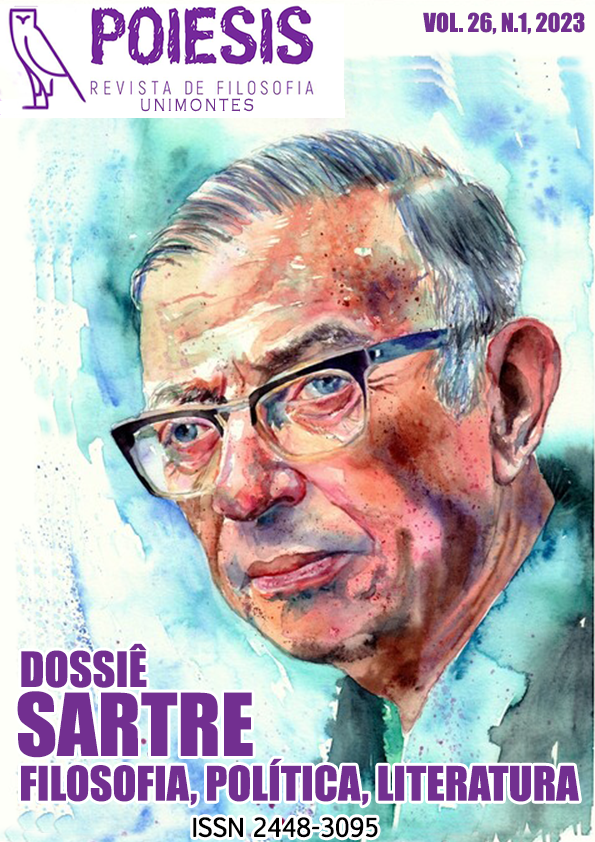ABOUT LIFE AND NARRATION IN JEAN-PAUL SARTRE AND PAUL RICŒUR: A VIEW FROM THE PROBLEM OF THE MULTIVOCITY OF THE CONCEPT OF E
Keywords:
Existencialismo; vida e narrativa; Jean-Paul Sartre; Paul Ricœur.Abstract
In this text, initially will be presented the opposing perspectives of Jean-Paul Sartre and
Paul Ricœur on the relationship between living and narrating. If for Sartre, life and narrative are
incompatible, since the philosopher understands that narratives are mere falsifications of singular
experiences, for Ricœur, on the other hand, the experience has a previous structure that allows the
anchoring of narratives in life itself, what he called pre-narrative traits of actions. After this initial
clarification, this text also presents the hypothesis that this opposition between the two french
philosophers is due to the fact that both operate with different concepts of experience, because Sartre uses the concept derived from the philosophies of the cogito, a tradition that develops in
transcendental philosophy and culminates in phenomenology, while Ricœur, in turn, belongs to the
tradition that has its bases in hermeneutics, above all in Wilhelm Dilthey, for whom living experience
is expressed in a broader way than the mere relationship of a consciousness with its intentional object,
and it has significant developments in the thoughts of Walter Benjamin and Hannah Arendt. To
demonstrate this hypothesis, the distinction made by Benjamin between experience [Erfahrung] and
living [Erlebnis] will be fundamental, as well as the connection between memory and narrative in
Arendt, something that is also found in Benjamin. If this hypothesis is proved, it will be possible to
affirm that the two perspectives antagonize each other only in appearance, so that both philosophers
would be right about what they say about the relationship between experience and narratives, at the
same time, although not under the same aspect.
Downloads
References
ARISTÓTELES. Sobre a arte poética. Belo Horizonte: Autêntica Editora, 2018.
ARENDT, Hannah. A condição humana. Tradução de Roberto Raposo. 10 e.d. Rio de Janeiro: Forense Universitária, 2007.
_______________. Entre o passado e o futuro. 2ª ed. São Paulo: Editora Perspectiva S.A., 1972.
BENJAMIN, Walter. Experiência e pobreza. Obras escolhidas: Magia e técnica, arte e política. São Paulo: Brasiliense, 1994A.
________________. O narrador. Obras escolhidas: Magia e técnica, arte e política. São Paulo: Brasiliense, 1994B.
________________. Sobre alguns temas em Baudelaire. Obras escolhidas: Magia e técnica, arte e política. São Paulo: Brasiliense, 1994C.
CASTRIOTA, Leonardo Barci. Walter Benjamin e as cidades: choque, vivência e memória. Número temático: Desenho e Educação: Cultura Visual e Cidade. A Cor das Letras - UEFS, n. 13, 2012.
CARR, David. Narrative and the Real World: An Argument for Continuity. In: History and Theory, Vol. 25, No. 2, 1986, pp. 117-131.
DESCARTES, René. Discurso sobre o método. Tradução de Márcio Pugliesi e Norberto de Paula Lima. São Paulo: Editora Hemus, [s.d.].
________________. Meditações sobre filosofia primeira. Edição bilíngue. Tradução de Fausto Castilho. Campinas, SP: Editora Unicamp, 2004.
DILTHEY, Wilhelm. A construção do mundo histórico nas ciências humanas. Tradução de Marco Casanova. São Paulo: Editora UNESP, 2010.
________________. O surgimento da hermenêutica (1900). Numen: revista de estudos e pesquisa da religião, Juiz de Fora, v.2 n. 1, 1999, pp. 11-32.
DRUCKER, Claudia Pellegrini. A narrativa como gênero literário ― Ricoeur e a poética. In: NASCIMENTO, C. R.; WU, R. Pensar Ricoeur: vida e narração. Porto Alegre: Clarinete, 2016, pp. 65-85.
GRONDIN, Jean. Hermenêutica. São Paulo: Parábola Editorial, 2012.
HEIDEGGER, Martin. Ser e tempo. Edição bilíngue. Tradução de Fausto Castilho. Campinas, SP: Editora Unicamp; Petrópolis, RJ: Editora Vozes, 2012.
HOMERO. Ilíada. Rio de Janeiro: Nova Fronteira, 2015.
HUSSERL, Edmund. Meditações cartesianas: uma introdução à fenomenologia.
Tradução, apresentação e notas: Fábio Mascarenhas Nolasco; Revisão técnica Tommy Akira
Goto. São Paulo: Edipro, 2019.
________________. Ideias para uma fenomenologia pura e para uma filosofia fenomenológica: introdução geral à fenomenologia pura. Tradução de Márcio Suzuki. Aparecida, SP: Ideias & Letras, 2006.
FREUD, Sigmund. A interpretação dos sonhos. In: Edição Standard Brasileira das Obras
Psicológicas Completas de Sigmund Freud. Rio de Janeiro: Ed. Imago, 1972.
_______________. O inconsciente (1915). In Obras Completas (Volume 12). Tradução de Paulo César Lima de Souza. Companhia das Letras, 2011.
GAGNEBIN, Jeanne Marie. História e narração em Walter Benjamin. São Paulo : Perspectiva, 2013.
GEERTZ, Clifford. A interpretação das culturas. Rio de Janeiro: LTC, 2008.
KANG, Jaeho. O espetáculo da modernidade: a crítica da cultura em Walter Benjamin. Novos Estudos, 2009.
KANT, Immanuel. Crítica da razão pura. 6. ed. Lisboa: Fundação Calouste Gulbenkian, 2003.
MACINTYRE, Alasdair. Depois da virtude. Tradução Jussara Simões. Bauru-SP: EDUSC, 2001.
PLATÃO. A república. Lisboa: Fundação Calouste Gulbenkian, 2010.
RICŒUR, Paul. Da interpretação: ensaio sobre Freud. Tradução de Hilton Japiassu. Rio de Janeiro: Imago Editora LTDA., 1977.
____________. Écrits et conférences 1: autour de la psychanalyse. Paris: Éditions du Seuil, 2008.
____________. Le conflit des interprétations: essais d’herméneutique. Paris: Éditions du Seuil, 2013. E-book.
_____________. O si-mesmo como outro. São Paulo: Editora WMF Martins Fontes, 2014.
____________. Tempo e narrativa (Volume 1). São Paulo: Editora WMF Martins Fontes, 2010.
ROSSATTO, Noeli Dutra. Vida e narrativa. In: GALLINA, Albertinho; SARTORI, Carlos Augusto; SCHNEIDER, P. R. (Orgs.). Conhecimento, Discurso, Ação. Ijuí: Ed. Unijuí, 2010, pp. 117-134.
SARTRE, Jean-Paul. Esboço para uma teoria das emoções. Tradução de Paulo Neves. Porto Alegre: L&PM, 2012.
________________. La nausée. Paris: Éditions Gallimard, 1938.
________________. La transcendance de l’Ego: Esquisse d’une Description Phénoménologique. Paris: Librairie Philosophique J. VRIN, 1966.
________________. O existencialismo é um humanismo. Tradução de João Batista Kreuch. 4ª ed. Petrópolis, RJ: Vozes, 2014.
________________. O ser e o nada. Petrópolis, RJ: Vozes, 2013.
SCHLEIERMACHER, Friedrich D. E. Hermenêutica: arte e técnica da interpretação. Tradução e apresentação de Celso Reni Braida. 10. ed. Petrópolis, RJ: Vozes, 2015.
SCHMIDT, Lawrence K. Hermenêutica. Tradução de Fábio Ribeiro. Petrópolis, RJ: Vozes, 2014.
SCHNÄDELBACH, Herbert. Filosofía en Alemania (1831-1933). Traducción de Pepa Linares. Madrid: Ediciones Cátedra, 1991.
Downloads
Published
How to Cite
Issue
Section
License
Copyright (c) 2023 Revista Poiesis

This work is licensed under a Creative Commons Attribution-NonCommercial-NoDerivatives 4.0 International License.





.png)

